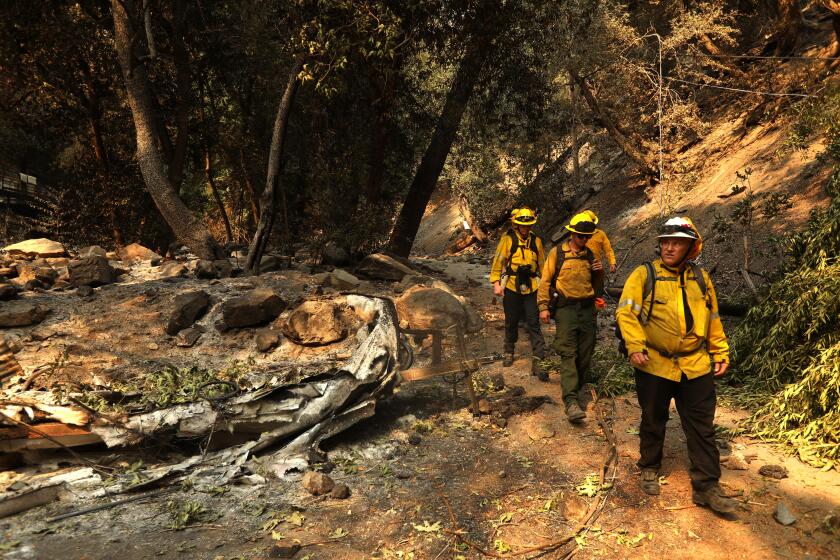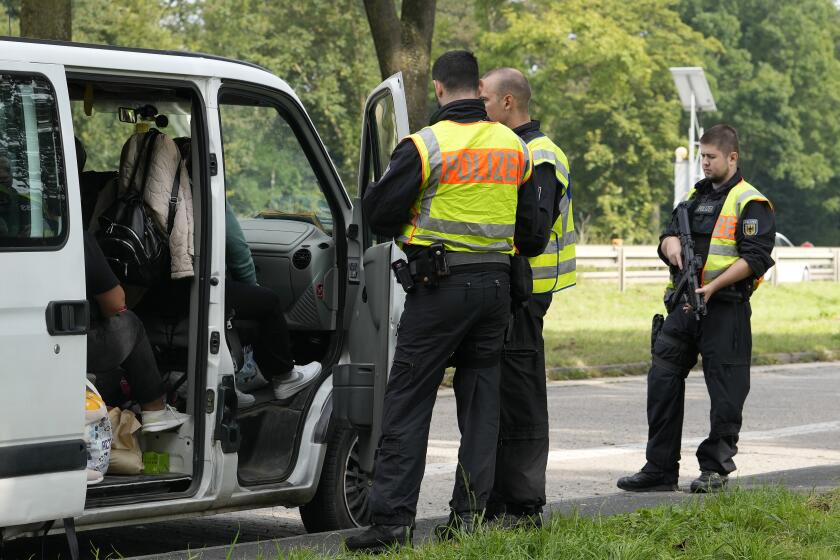Airlines may delay flights further to avoid tarmac-delay fines
Starting late this month, airlines that leave passengers stranded on a tarmac in a delayed plane for three hours or more can face a hefty fine under new rules adopted by the U.S. Department of Transportation.
If carriers don’t let passengers out of the plane before the three-hour mark, the agency can fine them up to $27,500 per customer.
At least three domestic airlines have announced plans to avoid the penalties. But that won’t necessarily cut down on delays.
US Airways and Continental Airlines have both unveiled procedures to return the plane to the gate if it can’t take off before the three-hour limit.
American Airlines Chief Executive Gerard Arpey said his carrier -- the nation’s second-largest -- has modified a previous plan to unload passengers stranded four hours or longer.
US Airways, the sixth-largest domestic carrier, announced its plans in an employee newsletter last week.
For example, if a US Airways flight is delayed 90 minutes, the crew offers drinks and snacks to avoid a fine that applies if fliers are delayed for two hours without food and water.
After 2 1/2 hours, the airline’s operations center makes a decision: Either return the plane to the gate or, if a takeoff is imminent, keep it in line on the tarmac.
In 2009, US Airways alone had 193 flights that were delayed more than three hours. If each had an average of 200 passengers, under the new rules the fines could add up to more than $1 billion.
It is unclear what happens to a flight after it returns to the gate, but American’s Arpey predicted bad news for passengers: “Most certainly, it will result in more cancellations.”
Costliest city is still New York
If you can afford to stay in New York, you can afford to stay anywhere.
The 2010 rankings for the most expensive cities for business travelers put New York at the top again, with the average daily cost for food, hotel and a car rental totaling $622.
The results came from the annual survey of hotel, restaurant and car rental costs by the Business Travel News, a publication for business travel managers, of 100 U.S. travel destinations. New York topped the list last year and in 2008 as well.
White Plains, N.Y., and Detroit inched up in the list, with hotel and car rental prices rising in both cities.
Las Vegas, on the other hand, dropped on the list.
Last year, Sin City ranked as the nation’s 30th most expensive city to visit. It fell to 45th this year, below such cities as Oakland, Cleveland and Pittsburgh.
Honolulu ranked ninth in the 2009 survey but dropped to 20th this year, below Minneapolis, Austin and Detroit.
Most hospitality experts blame what they call the “AIG affect” for the drop in hotel and restaurant prices at cities with a reputation for luxury and frivolity.
After the insurance giant American International Group Inc.took a federal bailout in 2008, it hosted a junket for senior executives at the St. Regis Monarch Beach resort and was then stung by public outrage. Since then, image-conscious executives have avoided holding corporate meetings in places known for fun and opulence.
“There is still a huge residual from the AIG affect,” said Carl Winston, the director of the hospitality and tourism management program at San Diego State University.
Los Angeles dropped to 16th on the list this year from 13th in 2009, based on cheaper car rental rates.
Prank tells guests to break window
You are asleep in a hotel room, and a frantic caller warns you that the building is on fire, instructing you to pull the fire alarm and break the window.
The American Hotel & Lodging Assn. has issued a warning, telling hotel guests to think twice before following such instructions. Prank callers have been victimizing hotel guests in California, Alabama, Arkansas, Florida and Nebraska, the trade group warned.
The group advises hotel guests who get such a call to phone the front desk to see if the emergency is legitimate.
In Orlando, Fla., the victim of such a prank busted a hotel window with part of a toilet after his wife took the call. “When I broke the window, I got suspicious,” the hotel guest told the Orlando Sentinel. “It didn’t seem right, but she was panicking, so I continued.”
Sign up for The Wild
We’ll help you find the best places to hike, bike and run, as well as the perfect silent spots for meditation and yoga.
You may occasionally receive promotional content from the Los Angeles Times.



